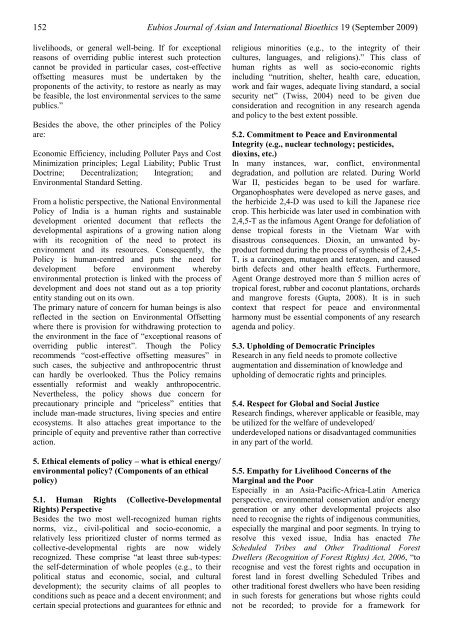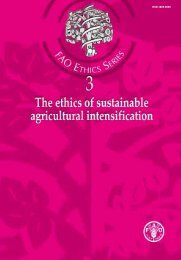Eubios Journal of Asian and International Bioethics EJAIB
Eubios Journal of Asian and International Bioethics EJAIB
Eubios Journal of Asian and International Bioethics EJAIB
Create successful ePaper yourself
Turn your PDF publications into a flip-book with our unique Google optimized e-Paper software.
152 <strong>Eubios</strong> <strong>Journal</strong> <strong>of</strong> <strong>Asian</strong> <strong>and</strong> <strong>International</strong> <strong>Bioethics</strong> 19 (September 2009)<br />
livelihoods, or general well-being. If for exceptional<br />
reasons <strong>of</strong> overriding public interest such protection<br />
cannot be provided in particular cases, cost-effective<br />
<strong>of</strong>fsetting measures must be undertaken by the<br />
proponents <strong>of</strong> the activity, to restore as nearly as may<br />
be feasible, the lost environmental services to the same<br />
publics.”<br />
Besides the above, the other principles <strong>of</strong> the Policy<br />
are:<br />
Economic Efficiency, including Polluter Pays <strong>and</strong> Cost<br />
Minimization principles; Legal Liability; Public Trust<br />
Doctrine; Decentralization; Integration; <strong>and</strong><br />
Environmental St<strong>and</strong>ard Setting.<br />
From a holistic perspective, the National Environmental<br />
Policy <strong>of</strong> India is a human rights <strong>and</strong> sustainable<br />
development oriented document that reflects the<br />
developmental aspirations <strong>of</strong> a growing nation along<br />
with its recognition <strong>of</strong> the need to protect its<br />
environment <strong>and</strong> its resources. Consequently, the<br />
Policy is human-centred <strong>and</strong> puts the need for<br />
development before environment whereby<br />
environmental protection is linked with the process <strong>of</strong><br />
development <strong>and</strong> does not st<strong>and</strong> out as a top priority<br />
entity st<strong>and</strong>ing out on its own.<br />
The primary nature <strong>of</strong> concern for human beings is also<br />
reflected in the section on Environmental Offsetting<br />
where there is provision for withdrawing protection to<br />
the environment in the face <strong>of</strong> “exceptional reasons <strong>of</strong><br />
overriding public interest”. Though the Policy<br />
recommends “cost-effective <strong>of</strong>fsetting measures” in<br />
such cases, the subjective <strong>and</strong> anthropocentric thrust<br />
can hardly be overlooked. Thus the Policy remains<br />
essentially reformist <strong>and</strong> weakly anthropocentric.<br />
Nevertheless, the policy shows due concern for<br />
precautionary principle <strong>and</strong> “priceless” entities that<br />
include man-made structures, living species <strong>and</strong> entire<br />
ecosystems. It also attaches great importance to the<br />
principle <strong>of</strong> equity <strong>and</strong> preventive rather than corrective<br />
action.<br />
5. Ethical elements <strong>of</strong> policy – what is ethical energy/<br />
environmental policy (Components <strong>of</strong> an ethical<br />
policy)<br />
5.1. Human Rights (Collective-Developmental<br />
Rights) Perspective<br />
Besides the two most well-recognized human rights<br />
norms, viz., civil-political <strong>and</strong> socio-economic, a<br />
relatively less prioritized cluster <strong>of</strong> norms termed as<br />
collective-developmental rights are now widely<br />
recognized. These comprise “at least three sub-types:<br />
the self-determination <strong>of</strong> whole peoples (e.g., to their<br />
political status <strong>and</strong> economic, social, <strong>and</strong> cultural<br />
development); the security claims <strong>of</strong> all peoples to<br />
conditions such as peace <strong>and</strong> a decent environment; <strong>and</strong><br />
certain special protections <strong>and</strong> guarantees for ethnic <strong>and</strong><br />
religious minorities (e.g., to the integrity <strong>of</strong> their<br />
cultures, languages, <strong>and</strong> religions).” This class <strong>of</strong><br />
human rights as well as socio-economic rights<br />
including “nutrition, shelter, health care, education,<br />
work <strong>and</strong> fair wages, adequate living st<strong>and</strong>ard, a social<br />
security net” (Twiss, 2004) need to be given due<br />
consideration <strong>and</strong> recognition in any research agenda<br />
<strong>and</strong> policy to the best extent possible.<br />
5.2. Commitment to Peace <strong>and</strong> Environmental<br />
Integrity (e.g., nuclear technology; pesticides,<br />
dioxins, etc.)<br />
In many instances, war, conflict, environmental<br />
degradation, <strong>and</strong> pollution are related. During World<br />
War II, pesticides began to be used for warfare.<br />
Organophosphates were developed as nerve gases, <strong>and</strong><br />
the herbicide 2,4-D was used to kill the Japanese rice<br />
crop. This herbicide was later used in combination with<br />
2,4,5-T as the infamous Agent Orange for defoliation <strong>of</strong><br />
dense tropical forests in the Vietnam War with<br />
disastrous consequences. Dioxin, an unwanted byproduct<br />
formed during the process <strong>of</strong> synthesis <strong>of</strong> 2,4,5-<br />
T, is a carcinogen, mutagen <strong>and</strong> teratogen, <strong>and</strong> caused<br />
birth defects <strong>and</strong> other health effects. Furthermore,<br />
Agent Orange destroyed more than 5 million acres <strong>of</strong><br />
tropical forest, rubber <strong>and</strong> coconut plantations, orchards<br />
<strong>and</strong> mangrove forests (Gupta, 2008). It is in such<br />
context that respect for peace <strong>and</strong> environmental<br />
harmony must be essential components <strong>of</strong> any research<br />
agenda <strong>and</strong> policy.<br />
5.3. Upholding <strong>of</strong> Democratic Principles<br />
Research in any field needs to promote collective<br />
augmentation <strong>and</strong> dissemination <strong>of</strong> knowledge <strong>and</strong><br />
upholding <strong>of</strong> democratic rights <strong>and</strong> principles.<br />
5.4. Respect for Global <strong>and</strong> Social Justice<br />
Research findings, wherever applicable or feasible, may<br />
be utilized for the welfare <strong>of</strong> undeveloped/<br />
underdeveloped nations or disadvantaged communities<br />
in any part <strong>of</strong> the world.<br />
5.5. Empathy for Livelihood Concerns <strong>of</strong> the<br />
Marginal <strong>and</strong> the Poor<br />
Especially in an Asia-Pacific-Africa-Latin America<br />
perspective, environmental conservation <strong>and</strong>/or energy<br />
generation or any other developmental projects also<br />
need to recognise the rights <strong>of</strong> indigenous communities,<br />
especially the marginal <strong>and</strong> poor segments. In trying to<br />
resolve this vexed issue, India has enacted The<br />
Scheduled Tribes <strong>and</strong> Other Traditional Forest<br />
Dwellers (Recognition <strong>of</strong> Forest Rights) Act, 2006, “to<br />
recognise <strong>and</strong> vest the forest rights <strong>and</strong> occupation in<br />
forest l<strong>and</strong> in forest dwelling Scheduled Tribes <strong>and</strong><br />
other traditional forest dwellers who have been residing<br />
in such forests for generations but whose rights could<br />
not be recorded; to provide for a framework for

















